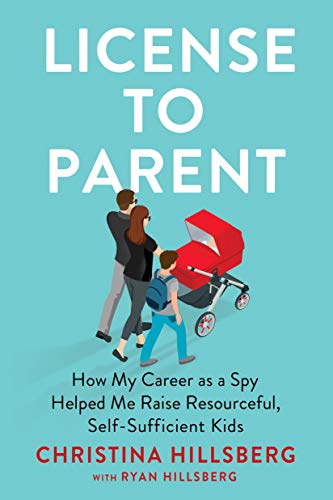“I’ll probably have the Talk with him sometime this weekend,” Ryan said as we were driving into town for a dinner date. His son Hunter’s eighth birthday was coming up, and Ryan had planned a bowling alley party with close friends and family. I wouldn’t be there, of course, since I hadn’t met any of my new boyfriend’s three kids yet.
“The Talk?” I asked. Did he mean a sex talk?
“You know, the Spy Talk,” he said nonchalantly.
“No, I don’t know. What do you mean ‘the Spy Talk’?”
“Oh, I thought I mentioned it. When the kids turn eight years old, I tell them I’m a spy,” he said, as if it was perfectly normal to share such an enormous secret with a child.
“You do?! What if they tell someone?” I asked worriedly.
“They won’t,” he said confidently.
His confidence wasn’t enough to convince me that telling kids that their parent was a real-life spy was a good idea. I wasn’t even sure telling my parents that I was a spy was a good idea, and yet, it seemed trusting kids with such important, potentially life-threatening information was an even worse one. Ryan, however, felt differently. And while I questioned his judgment, I knew he was someone who, at the end of the day, valued loyalty and trust beyond all else. I also knew that there was no one more important to him than his kids. So what gives?
In a spy’s game, one of the most important things to do is protect your sources. This can be done only with loyalty, trust, and the ability to keep your word. No one is going to betray their country with someone they can’t trust. It’s an operations officer’s responsibility to protect everything from the source’s identity when they write up the intelligence they receive from them, to their physical safety while meeting with them.
These values weren’t just demonstrated by upstanding operations officers like Ryan and several others I had the honor of working alongside (and many more I didn’t encounter directly); they underpin the very foundation of the CIA. But while creating a relationship of trust and loyalty with CIA assets was one thing—which Ryan happened to be quite good at—how could you possibly expect so much from an eight-year-old? What was Ryan’s logic for looping the kids in at such a young age?
It all came down to his ultimate goal: forging a strong, trusting relationship with his children. By the time they reached eight years old, he had been building the groundwork of a trusting bond for years. They understood the concept of keeping promises, and Ryan knew that he could trust them not to tell anyone his secret. But how exactly did he do this? And what made him so confident?
After nearly 10 years and two more kids together, I’ve learned from both Ryan and my experience at the CIA that one of the best ways to teach your kids how to keep promises is to actually live these principles yourself — in the same way that the best and most upstanding intelligence officers do. Here are some of my quick tips for building trust with your kids:
1. Use the phrase “I promise” as sparingly as possible. By limiting the times you use this phrase, you’re sending the message to your kids that these are not throwaway words. They carry weight and should be treated as such. If there’s ever any pushback or concern as to whether you’ll do something your kids are asking of you, this phrase offers the peace they need, but only when you’ve given it the appropriate weight it deserves.
2. Keep your word. When you do choose to say, “I promise,” always follow through, no matter what. This helps your kids to learn that when you use those words, it’s a sure thing. You can’t forge long-lasting, trusting relationships with your partner or your children without keeping your word. If something happens that is out of your control and it affects your ability to keep your promise, communicate that with your child so that they understand. Life happens sometimes, and we’re only human, which means we can forget things. Be sure to distinguish between falling short because you didn’t take the promise seriously and falling short because you’re human and had too much on your mind. You should do everything in your power not to forget or break a promise. Set an alarm on your phone, write it on a sticky note or on your hand, do whatever you need to do.
3. Know how to say I’m sorry—to your partner and to your kids. This one is so important in building a relationship of trust. When you make a mistake—and for parents it’s when, not if—say you’re sorry. When Ryan and I have a disagreement or get into an argument in front of the kids, we make it a point to apologize to each other in front of them, even if we’ve already resolved it behind the scenes. We want our kids to see that reconciliation. Likewise, if we’ve done something to our kids that warrants an apology, we swallow our pride and say, “I’m sorry.” This one has been especially humbling for me as a stepmom, particularly all those times I lost my cool thanks to pregnancy hormones. Trust me when I say that there’s nothing more humbling than apologizing to your teenage stepchildren for something that seemed totally rational at the time yet you now know was just plain crazy.
4. Use your own discretion when determining what and how much to share with your kids. There are ways to emphasize loyalty and trust that don’t necessarily include sharing secrets or private information that may not be appropriate for little ears. Use your best judgment when it comes to the types of information you choose to share with your children. Each family is different. For example, it wasn’t until I became an adult that my mom started sharing with me whom she voted for in previous presidential elections. Perhaps it was a generational thing, or maybe it was just what she thought was appropriate or not appropriate to share with kids, but when I was growing up, she always said religion and politics were off-limits. In your family, you and your partner can decide what is or isn’t off-limits with your children.
If you’re lucky enough that your child is already sharing private information with you, congrats! You’ve built a trusting relationship with them. At this point, you need to do everything you can so as not to jeopardize the progress you’ve made. If you’re not quite there yet, just know that each time they confide in you, or you in them, you’re taking baby steps toward that trusting relationship. And each time you keep your word when you’ve promised them something, that’s another stepping-stone on your way there.
I recommend you begin incorporating these tips with your children through open and honest communication as early as possible so that it becomes naturally ingrained and part of the way they view the world. This will help your kids in their own lives as they build genuine relationships with others —whether it’s colleagues, friends, or romantic partners.



